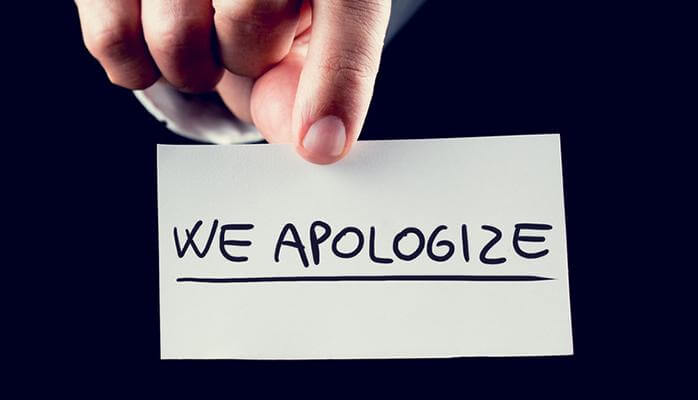Everyone makes mistakes. You charged for the wrong plan on a Customer’s mobile bill or sent an ‘Extra Small’ instead of a Medium on the Jacket a Customer ordered online. More serious mistakes could be that as a Doctor, you misdiagnosed a life threatening condition that results in serious consequences for your patient and his or her loved ones. We all make mistakes. What should you do when this happens?
When you make a mistake, it’s best to admit it and apologize immediately.
The 6 Steps to a Good Apology
So how do you recover from a mistake with your customers? The answer is best summarized in an article I read by Kerry O’Malley, called, “The Right Way to Admit You Made a Mistake in Business.” She gives us all a great list that includes:
- Act quickly. Sooner is always better than later.
- Apologize in person. It means more when you are physically present.
- Explain what happened. Give them the facts of the situation and avoid blame.
- Show how you are going to avoid the problem in the future. Mistakes are nothing if not opportunities in disguise.
- Apologize. Use the actual words, “I’m sorry.”
- Make restitution. If possible and appropriate, so what you can do to make it right. Be careful here, however, because sometime you can unwittingly do too much to compensate, which can undermine future loyalty.
The only other addition I might add to the list is for you to express how you feel about the mistake. Acknowledging your emotions is key to communicating with your customer. By being honest about how you feel about the mistake, you create a personal relationship that contributes to the Customer’s feelings of being important and “cared for.” The only time I would caution against this tactic is if you don’t feel like you are to blame and are have bitter feelings about the situation. As I have written before, these feelings will make the apology seem insincere and will lead to nothing good.
The strategy above works great for most businesses to business and business to customer relationships. It’s honest; it’s proactive, and it’s the best you can do in the situation. Most of all, it offers an opportunity for your customer to decide what to do and strengthens the relationship between you…most of the time anyway.
Why it’s Important to Apologize Even When it’s Difficult
The act of apologizing is difficult for some people because it makes them feel vulnerable. Feeling open can be scary and can drive some people to hide from the situation, avoiding the customer or client to avoid the feelings of vulnerability. While avoidance might or might not result in bad consequences for a business relationship (although I am certain that it will only be bad), it can have terrible repercussions on a medical career.
Medscape.com had an excellent article on why some patients don’t sue their doctors, even when they have a good case. To summarize the article, patients who sue are the ones where the doctor avoids them, denying them both an explanation and assurance that the problem will get fixed for the future. As you read before, these are both important parts of an apology in the above list. According to the article, many patients pursue litigation when denied these answers. Their goal, in many cases, is to get these answers, not to punish the physician. In many cases, an honest conversation between the physician and the patient or their family results in them not filing a lawsuit against the doctor to blame.
What is true no matter what the mistake and what the consequences, is that all of us realize that people all make mistakes. No one likes the consequences of their mistakes. No one relishes the thought of calling the client they have let down or the customer that is rightfully frustrated and explain that they are the one that is responsible. I can’t even imagine how a surgeon or doctor must feel when they realize their mistake resulted in a patient’s death.
Being proactive, however, with honesty is the best policy, no matter how distasteful it is. Most people can forgive a person for making a mistake. Few people, however, can forgive a person from blaming others, denying responsibility or covering up their errors. These actions create an emotional response that will not drive value for anyone concerned and will destroy trust in the Customer relationship.
Elton John said, “Sorry Seems to Be the Hardest Word.” In many ways, he is right. Difficult or not, it’s the right word when you made a mistake, followed by the other words that apply to the list for a good apology. Honesty is the best policy, and the only policy that gives you a chance for Customer retention.
What do you do when you make a mistake? I’d be interested to hear your insight in the comments below.
 For more Customer Experience concepts, register for our Advanced Customer Experience Management (CEM) Certification Course beginning on April 20th.
For more Customer Experience concepts, register for our Advanced Customer Experience Management (CEM) Certification Course beginning on April 20th.
Please click here to learn more.
If you enjoyed this post, you might be interested in the following blogs:
Colin Shaw is the founder and CEO of Beyond Philosophy, one of the world’s first organizations devoted to customer experience. Colin is an international author of four best-selling books and an engaging keynote speaker.
Follow Colin Shaw on Twitter @ColinShaw_CX


